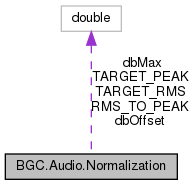A collection of some common procedures related to level scaling of Audio More...

Public Types | |
| enum | Scheme { Scheme.RMS = 0, Scheme.Peak, Scheme.RMSProscribed, Scheme.MAX } |
Static Public Member Functions | |
| static void | SPLToAdjustmentDB (double dbSPLL, double dbSPLR, out double dbAdjustL, out double dbAdjustR, Calibration.Source source=Calibration.Source.Custom) |
| static void | GetAmplitudeFactors (double dbSPLL, double dbSPLR, out double factorL, out double factorR, Calibration.Source source=Calibration.Source.Custom) |
| static void | Normalize (double desiredLevel, float[] samples, float[] destination=null, Scheme scheme=Scheme.RMS, Calibration.Source source=Calibration.Source.Custom) |
| Normalize the input sound buffer. Leave destination null to normalize inplace. More... | |
| static void | Normalize (double desiredLevel, double effectiveRMS, float[] samples, float[] destination=null, Scheme scheme=Scheme.RMSProscribed, Calibration.Source source=Calibration.Source.Custom) |
| Normalize the input sound buffer. Leave destination null to normalize inplace. More... | |
| static float [] | NormalizeMono (double desiredLevel, float[] monoInput, float[] stereoOutput=null, int inputOffset=0, int outputOffset=0, int sampleCount=int.MaxValue, Scheme scheme=Scheme.RMS, Calibration.Source source=Calibration.Source.Custom) |
| Normalize the input sound buffer. Leave destination null to allocate a new stereo output array. More... | |
| static float [] | NormalizeMono (double desiredLevel, double effectiveRMS, float[] monoInput, float[] stereoOutput=null, int inputOffset=0, int outputOffset=0, int sampleCount=int.MaxValue, Scheme scheme=Scheme.RMS, Calibration.Source source=Calibration.Source.Custom) |
| Normalize the input sound buffer. Leave destination null to allocate a new stereo output array. More... | |
| static void | NormalizeStereo_RMS (double levelFactorL, double levelFactorR, float[] samples, float[] destination=null) |
| static void | NormalizeStereo_TargetRMS (double levelFactorL, double levelFactorR, double effectiveRMS, float[] samples, float[] destination=null) |
| static void | NormalizeStereo_Peak (double levelFactorL, double levelFactorR, float[] samples, float[] destination=null) |
| Peak Equivalence Level-Scaling More... | |
| static float [] | NormalizeMono_RMS (double levelFactorL, double levelFactorR, float[] monoInput, float[] stereoOutput=null, int inputOffset=0, int outputOffset=0, int sampleCount=int.MaxValue) |
| static float [] | NormalizeMono_TargetRMS (double levelFactorL, double levelFactorR, double effectiveRMS, float[] monoInput, float[] stereoOutput=null, int inputOffset=0, int outputOffset=0, int sampleCount=int.MaxValue) |
| static float [] | NormalizeMono_Peak (double levelFactorL, double levelFactorR, float[] monoInput, float[] stereoOutput=null, int inputOffset=0, int outputOffset=0, int sampleCount=int.MaxValue) |
| Peak Equivalence Level-Scaling More... | |
| static void | GetRMSScalingFactors (IBGCStream stream, double desiredLevel, out double scalingFactorL, out double scalingFactorR, Calibration.Source source=Calibration.Source.Custom) |
| static void | GetRMSScalingFactors (float[] stereoSamples, double desiredLevel, out float scalingFactorL, out float scalingFactorR, Calibration.Source source=Calibration.Source.Custom) |
| static void | GetMonoRMSScalingFactors (float[] monoSamples, double desiredLevel, out double scalingFactorL, out double scalingFactorR, Calibration.Source source=Calibration.Source.Custom) |
| static double | CalculateRMSLevel (float[] samples) |
| static void | StandardizeSoundRMSMono (float[] samples) |
| static void | StandardizeSoundRMSStereo (float[] samples) |
Data Fields | |
| const double | dbMax = 90.0 |
| const double | dbOffset = 80.0 |
| const double | RMS_TO_PEAK = 2.8 |
| const double | TARGET_RMS = 1.0 / 128.0 |
| const double | TARGET_PEAK = TARGET_RMS * RMS_TO_PEAK |
Detailed Description
A collection of some common procedures related to level scaling of Audio
Definition at line 11 of file Normalization.cs.
Member Enumeration Documentation
◆ Scheme
|
strong |
| Enumerator | |
|---|---|
| RMS | |
| Peak | |
| RMSProscribed | |
| MAX | |
Definition at line 13 of file Normalization.cs.
Member Function Documentation
◆ CalculateRMSLevel()
|
inlinestatic |
Definition at line 796 of file Normalization.cs.
References BGC.Audio.Calibration.GetLevelOffset().

◆ GetAmplitudeFactors()
|
inlinestatic |
Definition at line 60 of file Normalization.cs.
◆ GetMonoRMSScalingFactors()
|
inlinestatic |
Definition at line 758 of file Normalization.cs.
Referenced by BGC.Audio.NormalizedMonoClip._Initialize().

◆ GetRMSScalingFactors() [1/2]
|
inlinestatic |
Definition at line 684 of file Normalization.cs.
References BGC.Audio.IBGCStream.GetChannelRMS().
Referenced by BGC.Audio.Filters.NormalizerMonoFilter._Initialize(), and BGC.Audio.Filters.NormalizerFilter._Initialize().


◆ GetRMSScalingFactors() [2/2]
|
inlinestatic |
Definition at line 715 of file Normalization.cs.
◆ Normalize() [1/2]
|
inlinestatic |
Normalize the input sound buffer. Leave destination null to normalize inplace.
- Parameters
-
samples Source of samples, destination as well if samples is null destination Leave null to normalize in-place
Definition at line 83 of file Normalization.cs.
◆ Normalize() [2/2]
|
inlinestatic |
Normalize the input sound buffer. Leave destination null to normalize inplace.
- Parameters
-
samples Source of samples, destination as well if samples is null destination Leave null to normalize in-place
Definition at line 137 of file Normalization.cs.
◆ NormalizeMono() [1/2]
|
inlinestatic |
Normalize the input sound buffer. Leave destination null to allocate a new stereo output array.
Definition at line 198 of file Normalization.cs.
◆ NormalizeMono() [2/2]
|
inlinestatic |
Normalize the input sound buffer. Leave destination null to allocate a new stereo output array.
Definition at line 251 of file Normalization.cs.
◆ NormalizeMono_Peak()
|
inlinestatic |
Peak Equivalence Level-Scaling
Definition at line 609 of file Normalization.cs.
◆ NormalizeMono_RMS()
|
inlinestatic |
Definition at line 471 of file Normalization.cs.
◆ NormalizeMono_TargetRMS()
|
inlinestatic |
Definition at line 548 of file Normalization.cs.
◆ NormalizeStereo_Peak()
|
inlinestatic |
Peak Equivalence Level-Scaling
Definition at line 414 of file Normalization.cs.
◆ NormalizeStereo_RMS()
|
inlinestatic |
Definition at line 313 of file Normalization.cs.
◆ NormalizeStereo_TargetRMS()
|
inlinestatic |
Definition at line 373 of file Normalization.cs.
◆ SPLToAdjustmentDB()
|
inlinestatic |
Definition at line 28 of file Normalization.cs.
References BGC.Mathematics.GeneralMath.Clamp(), and BGC.Audio.Calibration.GetLevelOffset().

◆ StandardizeSoundRMSMono()
|
inlinestatic |
Definition at line 842 of file Normalization.cs.
◆ StandardizeSoundRMSStereo()
|
inlinestatic |
Definition at line 868 of file Normalization.cs.
Field Documentation
◆ dbMax
| const double BGC.Audio.Normalization.dbMax = 90.0 |
Definition at line 21 of file Normalization.cs.
◆ dbOffset
| const double BGC.Audio.Normalization.dbOffset = 80.0 |
Definition at line 22 of file Normalization.cs.
◆ RMS_TO_PEAK
| const double BGC.Audio.Normalization.RMS_TO_PEAK = 2.8 |
Definition at line 24 of file Normalization.cs.
◆ TARGET_PEAK
| const double BGC.Audio.Normalization.TARGET_PEAK = TARGET_RMS * RMS_TO_PEAK |
Definition at line 26 of file Normalization.cs.
◆ TARGET_RMS
| const double BGC.Audio.Normalization.TARGET_RMS = 1.0 / 128.0 |
Definition at line 25 of file Normalization.cs.
The documentation for this class was generated from the following file:
- Audio/Normalization.cs
 1.8.13
1.8.13